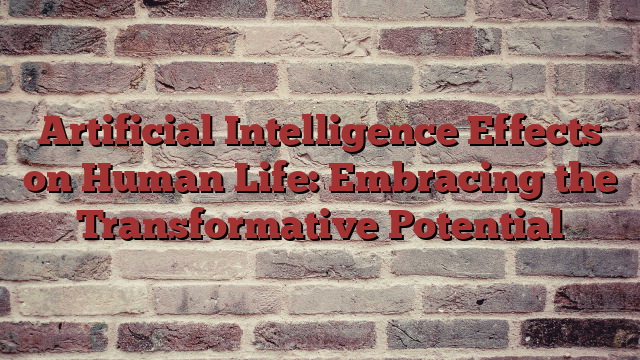Artificial Intelligence, or AI, has emerged as a revolutionary technology that is transforming various aspects of human life. This article delves into the remarkable effects of AI, exploring its applications across different domains and highlighting its potential to shape a better future for humanity.
Understanding Artificial Intelligence (AI)
AI represents the development of computer systems that can perform tasks that typically require human intelligence. Through Machine Learning, Neural Networks, and Natural Language Processing, AI algorithms can learn, adapt, and improve their performance over time.
AI in Daily Life
AI in Smart Devices
The integration of AI in smart devices has significantly enhanced our daily experiences. AI-powered virtual assistants, like Siri, Alexa, and Google Assistant, respond to voice commands and perform various tasks, such as setting reminders, answering questions, and controlling smart home devices. These virtual assistants are continually learning from user interactions, providing increasingly personalized and accurate responses.
AI in Healthcare
AI is revolutionizing healthcare by advancing diagnostics, treatment, and patient care. Machine Learning algorithms can analyze vast medical data, aiding in early disease detection and personalized treatment plans. AI systems can analyze medical images, such as X-rays and MRIs, with exceptional accuracy, assisting radiologists in making faster and more precise diagnoses. Additionally, AI-driven robots assist surgeons in intricate procedures, leading to improved surgical outcomes and reduced recovery times.
AI in Transportation
Autonomous vehicles, powered by AI, are reshaping the transportation industry. These self-driving cars use advanced sensors and algorithms to navigate roads safely and efficiently. In the future, autonomous vehicles may reduce traffic accidents, decrease congestion, and enhance transportation accessibility, particularly for people with disabilities or limited mobility.
The Impact of AI on the Workforce
The proliferation of AI has sparked discussions about its potential impact on the workforce. While some fear job displacement, AI also creates new opportunities. Routine and repetitive tasks may be automated, allowing human workers to focus on more creative and strategic endeavors, ultimately increasing productivity and job satisfaction. For example, AI-powered tools in industries like manufacturing streamline production processes, leading to higher output and reduced errors. It is essential for organizations to upskill and reskill their employees to adapt to the changing job landscape in the AI era.
AI and Education
AI has the potential to revolutionize education by personalizing learning experiences for students. Adaptive learning platforms use AI algorithms to tailor educational content based on individual learning styles and progress. These platforms can identify areas where students may struggle and provide additional support to help them overcome challenges. AI-powered virtual tutors and chatbots provide real-time assistance and feedback, making learning more engaging and effective. Moreover, AI analytics can help educators and policymakers identify trends and areas for improvement in the education system, leading to data-driven decision-making.
AI in Entertainment
AI has found a significant place in the entertainment industry. Streaming platforms leverage AI algorithms to recommend personalized content to users based on their preferences and viewing history. This not only enhances user experiences but also increases user retention and engagement. Moreover, AI is revolutionizing content creation, with AI-generated art, music, and storytelling pushing the boundaries of creativity. AI music composers are capable of producing original compositions in various styles, while AI art generators create unique artworks based on learned artistic patterns.
Ethical Considerations of AI
As AI technology continues to advance, ethical considerations become crucial. Ensuring the responsible development and deployment of AI is essential to prevent biases in decision-making, protect user privacy, and mitigate potential societal risks associated with AI. Transparency and explainability in AI algorithms are critical to building trust among users and stakeholders. Additionally, ethical guidelines and regulations must be established to govern the use of AI in sensitive areas like healthcare, finance, and law enforcement.
AI and Data Privacy
The effective functioning of AI often relies on vast amounts of data. However, this raises concerns about data privacy and security. Striking a balance between data utilization for AI advancements and safeguarding individuals’ privacy is paramount. Organizations must implement robust data protection measures, such as encryption and anonymization, to ensure the confidentiality of user data. Moreover, clear consent mechanisms and transparent data policies are necessary to inform users about how their data will be used and to provide them with control over their information.
AI in Customer Service
AI-powered chatbots and virtual assistants are transforming customer service interactions. These intelligent systems provide instant and personalized responses to customer queries, leading to improved customer satisfaction and reduced response times. AI chatbots can handle a large volume of customer inquiries simultaneously, freeing up human agents to focus on more complex issues and building deeper connections with customers. By continuously learning from customer interactions, AI chatbots become more efficient and accurate in addressing user needs over time.
AI in Environmental Preservation
AI is playing a pivotal role in environmental preservation and sustainability efforts. AI-driven systems are employed to monitor ecosystems, track wildlife populations, and analyze climate data. These insights aid in making informed decisions to address environmental challenges and promote eco-friendly practices. AI also contributes to optimizing resource usage in industries like agriculture and energy, leading to reduced environmental impact. By harnessing AI for environmental preservation, humanity can take significant steps toward a more sustainable future.
AI in Finance
The finance industry benefits significantly from AI applications. AI-powered algorithms help detect fraudulent transactions, assess investment risks, and provide personalized financial advice to customers. The use of AI in credit scoring models allows financial institutions to make more accurate lending decisions, benefiting both borrowers and lenders. Additionally, AI automates financial processes, increasing efficiency and reducing costs. However, regulatory frameworks must be in place to address potential biases in AI-based decision-making and ensure fair and transparent practices in the financial sector.
AI and Creativity
AI’s involvement in creative endeavors challenges conventional notions of human creativity. AI-generated art, music, and literature showcase the potential of human-AI collaboration, stimulating discussions about the boundaries of creativity and the role of AI as a creative tool. While AI can augment the creative process and inspire new ideas, human creativity remains unparalleled in its ability to convey emotions, abstract concepts, and deeper meanings. The fusion of AI and human creativity presents exciting possibilities for the future of art and culture.
AI in Scientific Advancements
AI’s ability to process vast amounts of data quickly makes it invaluable in scientific research. AI aids scientists in analyzing complex data sets, identifying patterns, and accelerating discoveries in fields such as genomics, drug development, and space exploration. AI-powered simulations and modeling enhance our understanding of intricate scientific phenomena, enabling researchers to make breakthroughs in previously uncharted territories. Collaborations between AI systems and human scientists have the potential to unlock new realms of knowledge and solve some of the most pressing global challenges.
AI in Agriculture
AI-driven precision agriculture is transforming farming practices. AI sensors collect data on soil conditions, weather patterns, and crop health, enabling farmers to make data-driven decisions about planting, irrigation, and pest control. This enhances crop yields, optimizes resource use, and promotes sustainable agriculture. AI also contributes to addressing food security issues by predicting crop diseases and optimizing distribution channels. By harnessing the power of AI, agriculture can become more efficient, productive, and environmentally friendly.
Conclusion
Artificial Intelligence has emerged as a powerful force with the potential to revolutionize every aspect of human life. From healthcare and education to transportation and entertainment, the impact of AI is far-reaching. As we embrace this transformative technology, it is essential to address ethical considerations, protect data privacy, and foster responsible AI development. By doing so, we can harness the full potential of AI to create a better, smarter, and more inclusive future for humanity.
Read More: buzziova.com



